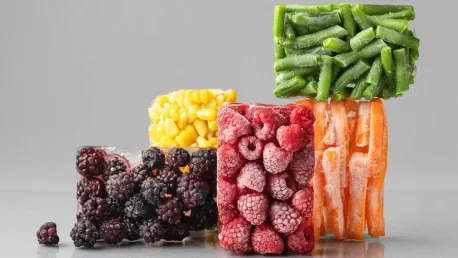The relationship between dietary fructose, particularly from high-fructose corn syrup, and cancer growth is a topic of growing concern. Over the past few decades, the consumption of high-fructose corn syrup has skyrocketed. While naturally occurring fructose in fruits, vegetables, and honey is generally considered safe, the excessive intake of fructose from processed foods may pose significant health risks. This includes the potential to support cancer development and progression, especially due to the way cancer cells might metabolize this sugar differently than normal cells.
The Rise of High-Fructose Corn Syrup in Modern Diets
The surge in high-fructose corn syrup consumption can be attributed to its cost-effectiveness and its high sweetness compared to other sugars. This artificial sweetener has become a common ingredient in many processed foods and beverages, contributing to a significant increase in overall fructose intake. Historically, humans have consumed fructose through natural sources like fruits and vegetables. However, the modern diet, replete with processed foods, has introduced much higher levels of this sugar. This shift has raised concerns among health experts about the potential long-term effects of excessive fructose consumption on human health, particularly in relation to cancer.
With high-fructose corn syrup dominating the ingredient lists of sodas, candies, and numerous processed snacks, the average person’s fructose intake has soared. The shift towards high-fructose corn syrup in processed foods is largely driven by its cost-effectiveness and sweetness. The body of emerging research indicates that this drastic change in dietary patterns may carry significant health risks. Health professionals are increasingly wary of its role in promoting not only obesity and diabetes but also possibly cancer. While naturally occurring fructose comes bundled with fiber, vitamins, and minerals, the fructose in high-fructose corn syrup is stripped of these beneficial components, making it easier to overconsume and potentially more harmful.
Fructose Metabolism and Cancer Cell Growth
Research has begun to reveal how cancer cells process fructose, providing insights that may partially explain the potential link between high-fructose corn syrup and cancer. At Washington University in St. Louis, studies have shown that cancer cells metabolize sugars differently than normal cells. Unlike normal cells, cancer cells have a high affinity for glucose, which they use extensively for growth and division. Interestingly, the study suggests that cancer cells might also utilize fructose in a similar manner, converting it into lipids in the liver to fuel tumor growth.
When the body consumes an excessive amount of fructose, it is converted into lipids rather than being used directly for energy. This lipid production can then support the rapid division and growth of cancer cells. This unique metabolic pathway is particularly crucial because cancer cells require substantial amounts of nutrients to divide and proliferate. Understanding this process is key to comprehending how dietary modifications could influence tumor growth. The implications are that excessive intake of fructose, especially in the form of high-fructose corn syrup, might create an environment conducive to cancer growth, thereby increasing the risks associated with processed food consumption.
Expert Insights on Fructose and Cancer
Gary Patti, PhD, from Washington University in St. Louis, provides historical context on fructose consumption, emphasizing its notable increase as an artificial sweetener in modern diets. He explains that while humans have always been exposed to fructose through natural sources, the recent uptick in its use in processed foods has prompted researchers to delve deeper into its potential effects on human health. This inquiry is fueled by the stark contrast between moderate consumption through fruits and the high intake through engineered food products.
Anton Bilchik, MD, PhD, a surgical oncologist, has highlighted a longstanding suspicion within the medical community regarding the role of sweeteners and processed foods in increasing cancer risks. According to Bilchik, this study offers a potential mechanism explaining how fructose in corn syrup and other processed food additives may contribute to cancer. He stresses the need for clinical studies to further explore and ultimately confirm the link between sweeteners and cancer in humans. Bilchik advocates for caution in consuming processed foods high in fructose until more conclusive evidence can inform dietary guidelines and public health recommendations.
Practical Recommendations for Reducing Fructose Intake
Dietitian Monique Richard, MS, RDN, LDN, offers practical advice on reducing fructose intake, underscoring the importance of choosing whole foods. She recommends prioritizing foods without packaging or labels, which naturally come with beneficial fiber, vitamins, and minerals that help moderate fructose absorption. Richard stresses the importance of being vigilant with reading labels and being aware of the myriad names under which sugar can appear in ingredients lists. This awareness can empower consumers to make informed choices, ultimately aiming to lower their intake of high-fructose corn syrup and similar sweeteners.
Educating consumers on these aspects can significantly aid in reducing consumption of harmful fructose. By focusing on whole, unprocessed foods, individuals can curtail their overall fructose intake and potentially mitigate the associated health risks, including cancer. This practical approach aligns well with public health recommendations that urge reducing processed food consumption as a strategy for improving overall health and preventing chronic diseases.
The Broader Implications of Fructose Consumption
The connection between dietary fructose, especially from high-fructose corn syrup (HFCS), and cancer growth has become an increasing concern. Over the past few decades, the consumption of HFCS has surged dramatically. While the fructose naturally found in fruits, vegetables, and honey is generally deemed safe, the excessive intake of fructose from processed foods may have significant health implications. This includes a potential role in supporting cancer development and progression. One particularly troubling aspect is how cancer cells might metabolize this sugar differently compared to normal cells. Research suggests that these cells could use fructose to promote their growth and proliferation more efficiently than other sugars. Therefore, understanding the differential effects of fructose on cancer cells is critical. Moreover, given the prevalence of processed foods in modern diets, it is vital to consider reductions in HFCS consumption and to promote whole, unprocessed foods as part of a healthy diet to potentially lower cancer risk.









